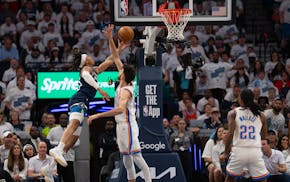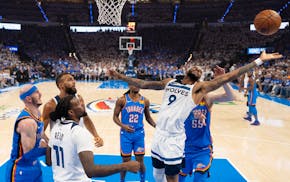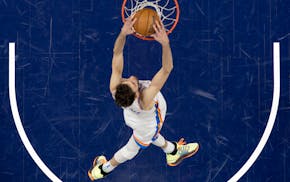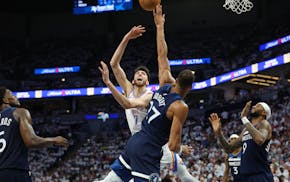The play call was too cute for the situation. At home, inside the 10-yard line, late in the game with a chance to upset the No. 4 team in college football.
The conservative coach did the most radical thing imaginable.
P.J. Fleck signed off on a throwback pass to his 330-pound left tackle.
Whaaaaaattttt!?
"I can't sit there and say I regret any decision," Fleck said.
That one was regrettable.
There is being aggressive as a coach, and then there is throwing screen passes to left tackles with the game on the line. This was an instance when Fleck needed to resist the urge to fool the Penn State defense with a trick play, even if that play had worked to perfection all week in practice.
One play didn't prevent a victory, but the Gophers used up a valuable down at a critical time when an upset was so close they could smell it.
Instead, Penn State coach James Franklin got rewarded for a series of gutsy decisions that enabled the Nittany Lions to escape Huntington Bank Stadium with a 26-25 victory.
"There is no hindsight," Fleck said. "I don't believe in could've, would've, should've."
I have begged Fleck to show more aggressiveness in his play-calling and game management over the years, especially against superior teams, but this one was a complete head-scratcher.
The Gophers trailed 26-22 with six minutes left in the game. Needing a touchdown to take the lead, they moved inside the Penn State 10.
On second-and-goal from the 8, Fleck and offensive coordinator Greg Harbaugh Jr. called a throwback pass to Aireontae Ersery.
Fleck said the offense rehearsed the play in practice based on a certain defensive alignment that Penn State had shown in previous games. The Nittany Lions lined up that way on that down, except this time, edge rusher Abdul Carter — a potential top-10 draft pick in the NFL draft — flared out and covered Ersery.
Quarterback Max Brosmer recognized it and threw the ball away.
"If [Carter] doesn't pop out, there's nobody there," Fleck said. "It just didn't come together how it came together in practice. But I love the call. I would call it all over again based on the look that we had."
Fleck noted that another trick play called in the first half resulted in a 21-yard touchdown pass, which is true. The key difference? Brosmer threw the ball to an actual pass catcher, tight end Jameson Geers.
The double reverse had Darius Taylor, Daniel Jackson and Brosmer — the offense's three best players — handle the ball before the pass.
Timing matters too.
With the game on the line, they asked their left tackle to do something he's never done in a game.
The comeback to unsuccessful trick plays is always the same: Well, if it had worked, the coach would be a genius.
Sure, by nature, trick plays are ripe for second-guessing. But it comes down to situation and percentages. What had a better chance of a successful outcome, throwing the ball to Ersery or throwing the ball to any one of their talented skill players?
The Gophers followed that play with an incomplete pass to Elijah Spencer on third down. Fleck opted for a field goal to cut the lead to one.
"Kicking the field goal was the best decision," he said. "That's the smart decision and the best decision. It's not just smart and safe, it's the best decision."
I understand that decision's rationale. The Gophers had all three timeouts, plus the two-minute timeout. The defense had played tough all game. If Fleck had gone for it on fourth-and-goal from the 8 and failed, the Gophers still would have needed a touchdown to win.
His defense did its job, but Franklin called a fake punt on fourth-and-1 from his own 34. The Gophers weren't in position to stuff it, resulting in a 32-yard gain.
Two more fourth-and-1 conversions enabled Penn State to run out the clock.
"There are no moral victories," Fleck said.
Nor should there be, because upsets happen every weekend in college football, and the Gophers had every opportunity to win that game.
Fleck was asked about his decision to go for it on fourth-and-1 on the opening drive, which Taylor converted on run and helped set up a touchdown.
"You're playing the No. 4 team in the country," he said. "You've got to make sure that you're always managing risk vs. reward, constantly. Early in the game, you can make up for something a lot later."
The decision to pass to his left tackle came very late, with little time to make up for it. Fleck said he doesn't regret that call, but he should.

Scoggins: Buckle up Wolves fans, it's going to be a very telling offseason

Scoggins: Finch's next challenge is to unleash the Wolves' youngsters

Scoggins: Timberwolves learn just how far behind they are

Scoggins: Chet Holmgren is in the right place at the right time


